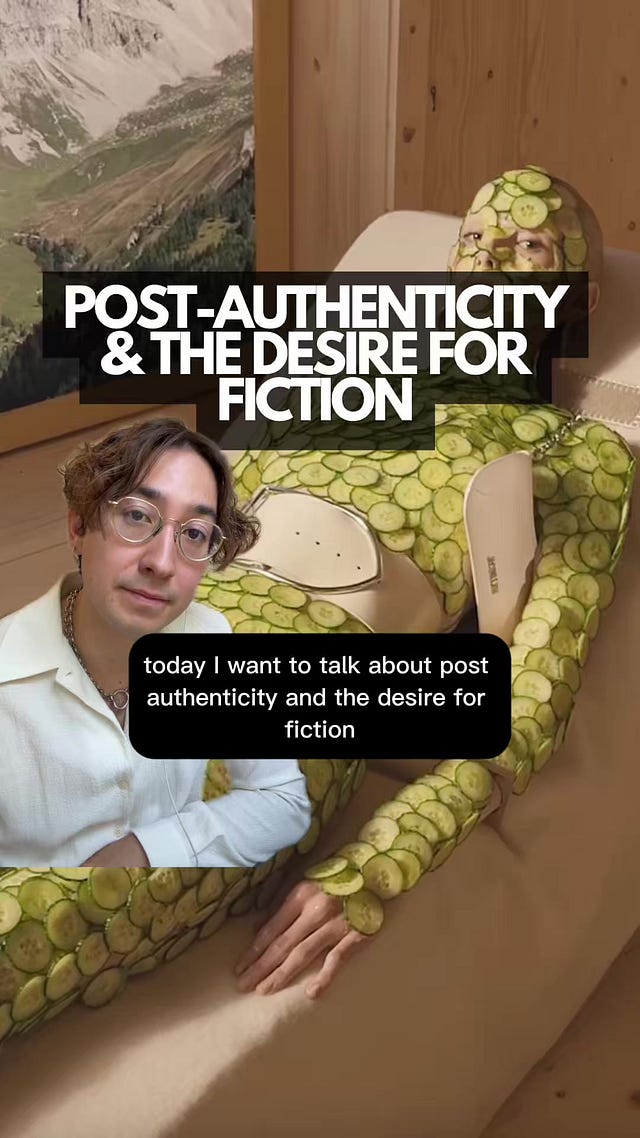179: Being authentic in the age of AI
Does the word have meaning any more, and what would that be?
Thanks, Charles.
I didn’t think I’d enjoy Rick Rubin speaking with Robert Downey Jr. for two hours and 17 minutes, but it turns out I couldn’t stop listening. Let’s just say if this quote is your cup of tea…
“The game is beautiful, the game is complex, the game is the Tao. And if you understand the Tao, you’re never playing a game that you win or lose. You’re only ever playing a game that you know how to play. And the worst part of life is when you don’t know how to play the game. Because then you’re never really on the field, you’re never really on a level playing field, you’re always playing catch up, you’re always getting slammed, you’re always on the sidelines, and you’re—everything’s a fucking Hail Mary. You know, that is defeat. And yet, as you know, there’s levels to this game. Which level are you playing, my kind friend?” - Robert Downey Jr.
…then you’ll find the conversation very much worth your time. And maybe you’ll learn a thing or two about prison or working with various film directors; I certainly did!
Most of all, their conversation felt authentic.
But what does that word mean?
Speaking of the stories we create to clarify who we are, or why we’re motivated the way we are, previous Curiosity+Courage podcast guest Jane Roper authored some salient words recently in her own newsletter.
“Money is a story. Borders are a story. Religions are stories. Class and caste and tribe are stories. The concept of superiority based on race or gender (bad word! shh!) is a story, as is the concept of human rights. Values and belief systems and systems of government are stories.
We very smart apes buy into these stories and countless more, choosing some of them intentionally, being born into others. Some are shared by massive populations, others by sub-populations within them. They undergird our reality, whether we’re conscious of them or not.”
I love Jane’s way with words. They resonate. And in resonating, I confer authenticity. And I wonder if authenticity itself is its own story, to extend from Jane’s perspective.
In this age, amidst the technology of the moment, what does authenticity mean? And can we even tell anymore?
Eugene Healey wonders if authenticity is even necessary.

 Tiktok failed to load.
Tiktok failed to load.Enable 3rd party cookies or use another browser
As creatives, as idea people, how do we define authenticity in our own work? I’m terribly fascinated with ChatGPT 4.5 and the latest Claude model and their co-writing capabilities. The tools are getting better.
Does any use of AI strip my work of so-called authenticity?
Educator Marc Watkins, who directs the AI Institute for Teachers and is an Assistant Director of Academic Innovation at the University of Mississippi, ruminated on that concept in his recent Rhetorica newsletter (bolding mine):
“What does authentic writing look like when AI is part of a writer’s process?
I’d argue that embracing this uncomfortable moment means rethinking what we ask of students and why. It means creating assignments that integrate AI thoughtfully rather than pretending we can build a walls against it. It means acknowledging the messy nature of writing—with its rants, tangents, and countless drafts—as having value by itself.”
I agree with messy, full stop.
My experiences writing with Al are riddled with mess. And joy. Frustration and elation.
The same as writing without AI (i.e. everything you’ve just read).
Bytedance’s Omnihuman
Researchers at Bytedance (TikTok) announced Omnihuman, “a multimodality-conditioned human video generation model. This means it combines different types of inputs, such as images and audio clips, to create realistic videos.” Judge for yourself.
I suspect we’ll begrudge authenticity in the realm of video before we agree to it in writing. And if Omnihuman is any indication, we’re already there.



